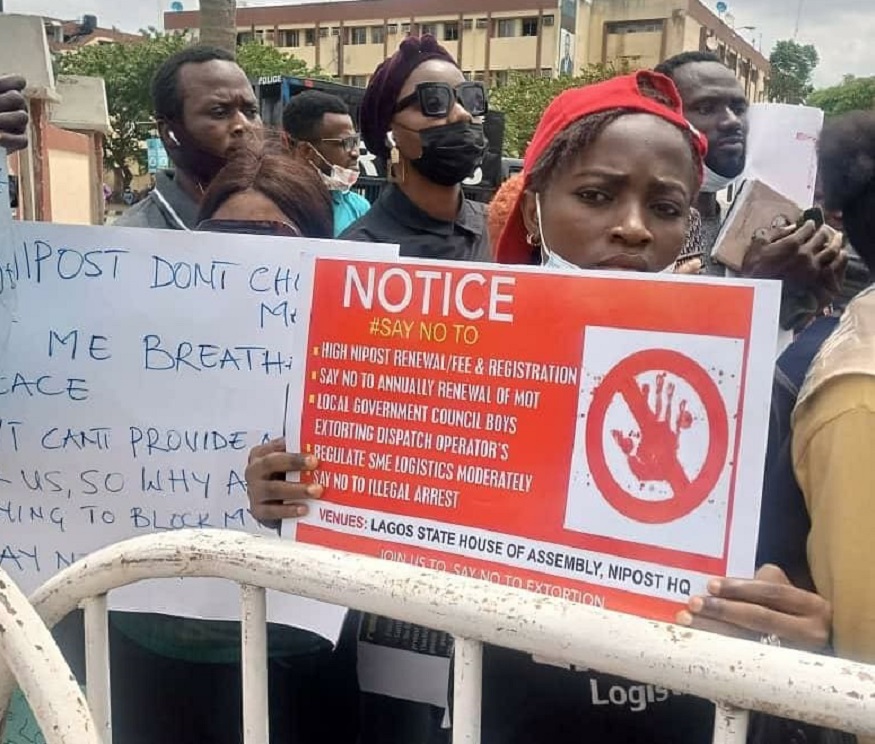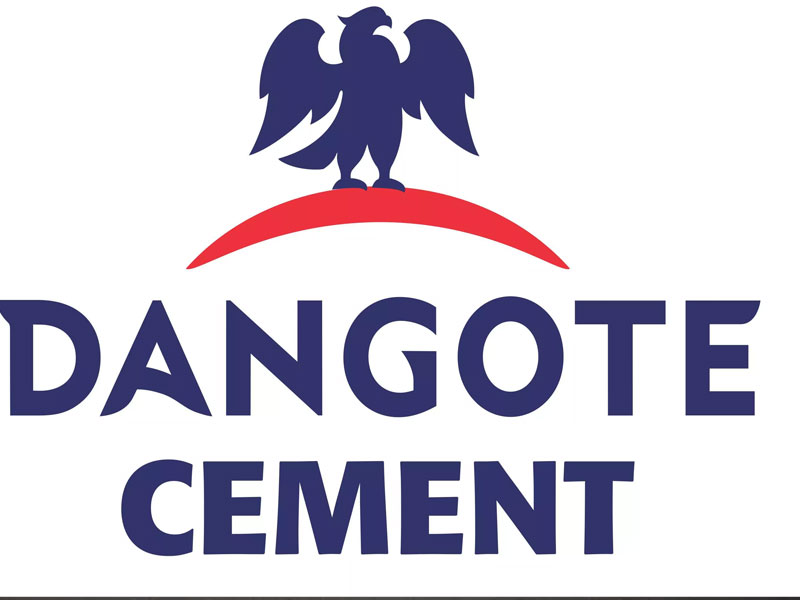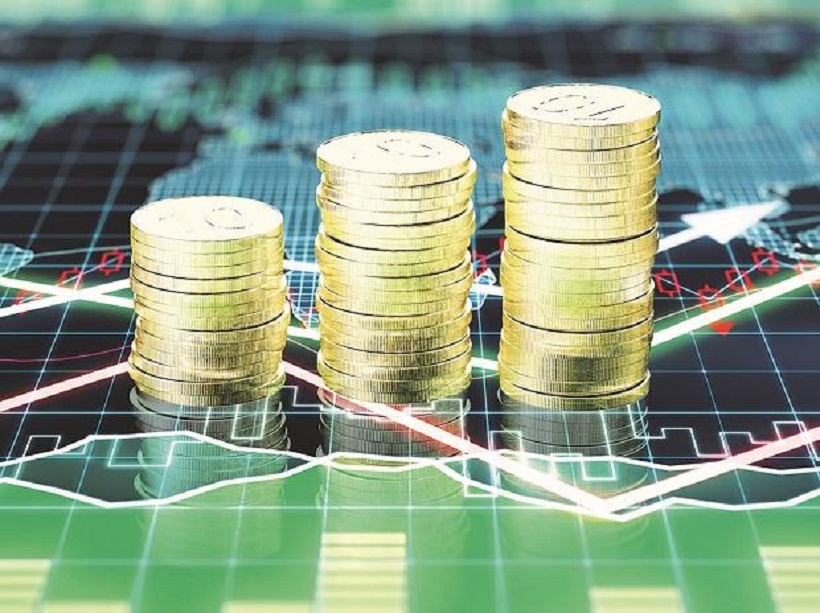Economy
Dispatch Operators Protest High Registration, Renewal Fees

By Dipo Olowookere
Some dispatch operators in Lagos has kicked against the high cost of registration and renewal fees by the Nigeria Postal Service (NIPOST).
They were on the premises of the Lagos State House of Assembly on Thursday to express their grievance over the issue, calling on the lawmakers to prevail on NIPOST to bring down the fees.
A spokesman for the group, Mr Jude Nwosu, said the exorbitant fees charged by the agency could chase them out of business, noting that they have contributed significantly to the growth of the economy through job creation, supported the telecommunications system, boosted e-commerce, supported the economy during COVID-19 pandemic and paid above the minimum wage.
“It is understood that NIPOST wants to sanitise the industry while making revenue.
“This revenue generation should not be at the expense of young entrepreneurs in the logistics business, most of who are in Lagos striving to make ends meet.
“The high fee will cripple a lot of us who contribute to the reduction of unemployment in the state,” Mr Nwosu informed the state’s legislative arm of government.
He, therefore, implored the parliament to intervene in the high cost of registration fee of N250,000 and yearly renewal of N100,000 which has been slammed on business owners.
“We appeal for a reduction to N50,000 and N20,000 for registration and renewal, respectively, and also the scrapping of irrelevant local government papers.
“Law enforcement agencies like the police and the Lagos State Traffic Management Authority (LASTMA) should stop harassing our riders unjustly, council boys should be taken off dispatch and made to stop harassing and intimidating our riders,” Mr Nwosu pleaded on behalf of the others.
Mr Jude Idimogu, while addressing the demonstrators on behalf of the Speaker of the House, Mr Mudashiru Obasa, assured that the petition would be attended to by the leadership of the parliament.
Economy
Manufacturers Kick Against Silent Reintroduction of 4% FOB Charge

By Adedapo Adesanya
The Manufacturers Association of Nigeria (MAN) has kicked against an alleged reintroduction of the controversial 4 per cent Free on Board (FOB) charge by the Nigeria Customs Service (NCS), which took effect on August 4, following a short pause to the implementation.
The Director-General of MAN, Mr Segun Ajayi-Kadri, said the move contradicts the government’s widely reported suspension of the charge, noting that manufacturers were concerned it would significantly increase the cost of importing raw materials, machinery, and spare parts that are not available locally.
Mr Ajayi-Kadri explained that the sudden reintroduction of the 4 per cent FOB charge led MAN to conduct a rapid technical assessment to confirm the implications for the sector.
The results, he said, showed unsettling issues that could severely impact manufacturing.
”The idea that the charge streamlines previous multiple charges and reduces cargo clearance costs does not reflect reality.
“The fact is that the cost of the 4 per cent charge on a manufacturing company is enormously higher than the combined effect of the 7 per cent surcharge and 1 per cent Comprehensive Import Supervision Scheme (CISS) levy,” he said.
He added that in other West African countries like Ghana, Côte d’Ivoire, and Senegal, targeted inspection or collection fees are kept within a 0.5 per cent to one per cent FOB range, with higher levies only on luxury or non-essential imports.
”The Nigeria Customs Service’s unilateral imposition of a uniform 4 per cent FOB levy would raise the cost of doing business, encourage informal cross-border sourcing, lead to cargo diversion, and promote under-declaration,” the DG noted.
Mr Ajayi-Kadri also urged the federal government and the Nigeria Customs Service to stop implementing the four per cent FOB charge and set a new timeline for its implementation, suggesting they extend it to December 31 to allow for an impact assessment and consultation with stakeholders.
This, he said, would determine an appropriate level of charges that would ensure the customs service performs efficiently.
”This timeframe would align with the January 2026 take-off date for recently introduced tax laws.
“It would allow a proper technical session with strategic stakeholders to discuss issues vital to the survival of affected businesses in Nigeria and the development of business-friendly implementation guidelines,” he added.
He suggested that, in the meantime, the NCS should retain the current one per cent CISS plus a 7 per cent cost of collection fee, stressing this will balance revenue generation with industrial competitiveness to save 230 million Nigerians from avoidable price increases.
Economy
Ogun Praises Dangote Cement for Exemplary Tax Compliance

By Aduragbemi Omiyale
Leading cement maker, Dangote Cement Plc, has been commended by the Ogun State Internal Revenue Service (OGIRS) for being a responsible corporate citizen, which contributes immensely to the development of the state by prompt payment of its taxes.
The revenue agency for the Gateway State said it was pleased with the consistent role of the cement miller as the highest tax-paying industrial organisation in the state.
The Director of Field Operations for OGIRS, Mrs Oluwaseun Olajube, while on a familiarisation tour of the 12mmtp Dangote Cement plant in Ibese, said the firm has set a benchmark for corporate responsibility and financial transparency in Ogun State, urging it not to drop its guard.
She expressed the agency’s commitment to strengthening alliance with the Ibese Plant in the spirit of transparency, accountability, and mutual benefit and reaffirmed its commitment to fostering stronger partnerships with key stakeholders in the state’s industrial sector.
“Dangote Cement Ibese Plant continues to demonstrate excellence in tax compliance, and we are proud to acknowledge their contribution to the economic development of our state,” she stated, reaffirming the commitment of the tax collector to fostering a business-friendly environment that rewards transparency and compliance.
In his remarks, the Dangote Cement Ibese Plant Director, Mr Ayyagari Subbaraidu, said the company would continue to contribute to the growth of Ogun State.
“We recognise that tax revenue is the backbone of economic development of States and remain committed to upholding the principles of compliance, accountability, and transparency in all our engagements with Ministries, Departments and Agencies of government,” Mr Subbaraidu said.
Recall that the chief executive of Dangote Industries Limited (DIL), Mr Aliko Dangote, had disclosed that his organisation paid over N402 billion in taxes in 2024 to the government, making it the highest taxpayer in the country.
Economy
Analysts Project Nigeria’s Foreign Reserves Rising to $45bn

By Adedapo Adesanya
Nigeria’s external reserves could rise to about $45 billion by the end of the year, market analyst say, following established trends.
Last Tuesday, the foreign exchange reserves of the country increased to $41 billion, the highest level recorded in 44 months, according to data from the Central Bank of Nigeria (CBN).
The development is a positive signal for the Naira, which has recorded one of its best periods of stability in recent months. On Monday, the local currency closed at N1,536 per Dollar at the official market.
The appreciation in the reserves also signalled a significant recovery following depletion driven by external debt repayments.
This month, the reserves have experienced a sustained appreciation. They increased by $1.56 billion from $39.54 billion on August 1 to $41.11 billion on August 22, representing a 3.95 per cent increase within the month.
According to the analysts at Cowry Assets Management in their weekly market report, the momentum of reserve growth appears likely to continue, supported by steady offshore inflows and potential external borrowings planned by the government.
“The combination of these factors should keep the reserves on an upward trajectory in the coming months. Our projection suggests that Nigeria’s reserves could rise to about $45 billion by the end of 2025, provided global risk conditions remain broadly supportive and offshore flows are not significantly disrupted. With the reserves position strengthening, the CBN will have greater flexibility to sustain its interventionist approach in the FX market. This, in turn, should help to maintain relative stability in the Naira across both official and parallel markets,” the experts said.
However, the analysts warned that challenges remain from externalities.
“As shifts in global financial markets or a sudden reversal in portfolio inflows could challenge the resilience of the current momentum. Nevertheless, the recent build-up represents a significant achievement and a positive signal for Nigeria’s external stability at a time when many emerging markets continue to grapple with external vulnerabilities,” they warned.
On their part, Meristem Securities analysts gave a lower expectation but maintained that the outlook was also positive. They projected that the reserves may well stay above the $40 billion threshold if current trends persist.
“The stronger reserve position is expected to enhance the CBN’s capacity to stabilise the Naira, bolster investor confidence, and support external balance. With oil receipts improving, portfolio inflows strengthening, and non-oil exports gaining traction, the momentum could be sustained in the near term. If current trends persist, reserves are likely to remain above the $40 billion threshold, providing a solid buffer for exchange rate management and broader macroeconomic stability,” the firm stated.
-

 Feature/OPED6 years ago
Feature/OPED6 years agoDavos was Different this year
-
Travel/Tourism9 years ago
Lagos Seals Western Lodge Hotel In Ikorodu
-

 Showbiz3 years ago
Showbiz3 years agoEstranged Lover Releases Videos of Empress Njamah Bathing
-

 Banking7 years ago
Banking7 years agoSort Codes of GTBank Branches in Nigeria
-

 Economy2 years ago
Economy2 years agoSubsidy Removal: CNG at N130 Per Litre Cheaper Than Petrol—IPMAN
-

 Banking2 years ago
Banking2 years agoFirst Bank Announces Planned Downtime
-

 Sports2 years ago
Sports2 years agoHighest Paid Nigerian Footballer – How Much Do Nigerian Footballers Earn
-

 Technology5 years ago
Technology5 years agoHow To Link Your MTN, Airtel, Glo, 9mobile Lines to NIN













